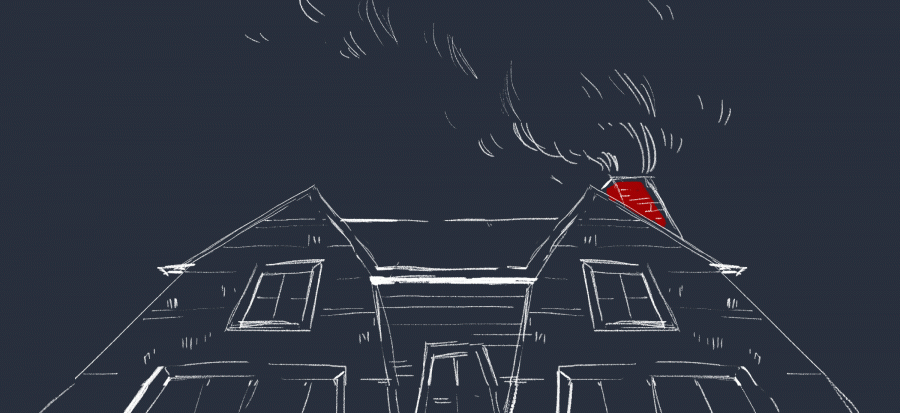In times of imminent danger, when adrenaline shoots into the bloodstream, the heart palpitates in overdrive, and breathing occurs more often and rapidly, the sympathetic sets the body into a state called “fight or flight.”
This physiological reaction occurs in the moment of a terrifying event, either mentally or physically, and releases hormones that trigger an individual to attack or flee from the threat, according to VeryWell Mind, a website dedicated to research on the psychology of the brain. Such feelings can develop in stressful situations such as the sight of a snake in the grass ahead, a burglar at the front door or a stranger’s approach on the sidewalk at night.
Yet, in cases of sexual assault worldwide, victims said they were unable to respond in either of the traditional responses during the event, according to the BBC. Instead, those individuals experienced tonic mobility: a state of involuntary temporary motor inhibition. A 2017 study conducted by the National Center for Biotechnology Information recorded of the 298 women who visited an emergency rape clinic in Sweden, 70 percent reported significant tonic immobility during the assault.
Those who feel tonic immobility during the assault are more likely to develop Post-Traumatic Stress Disorder (PTSD) and severe depression afterward than victims who hadn’t, according to the BBC. Rape, Abuse & Incest National Network, America’s largest anti-sexual violence organization, reported depression and PTSD as two of the most common psychological, involuntary reactions to any sexual assault situation; 81 percent of women and 35 percent of men reporting significant PTSD after experiencing sexual violence, according to the National Sexual Violence Resource Center (NSVRC).
Psychotherapist Dr. Jim Gerber specializes in trauma and PTSD and works with those who have experienced sexual abuse, many of whom are adults or older adolescents who were abused as children. Differing from a traditional therapist, psychotherapists treat mental disorders through psychological means in place of medical ones. In Dr. Gerber’s perspective, a person does not have trauma simply because he or she went through “something bad,” but the long-term effects differ from the person and from the circumstance.
“Psychological trauma is determined by the effect it has on the brain and the person’s sense of self, so, it certainly is possible that a person who is subject to sexual harassment may be traumatized by it, depending on your past life experience and the nature of what you’re enduring,” Dr. Gerber said. “But that would be identified by the person displaying symptoms of PTSD, such as alternatively feeling numb and overwhelmed, intrusions of past experience, hypervigilance, nightmares, those sorts of things.”
“Psychological trauma is determined by the effect it has on the brain and the person’s sense of self, so, it certainly is possible that a person who is subject to sexual harassment may be traumatized by it, depending on your past life experience and the nature of what you’re enduring.”
To best prevent the onset of PTSD, Dr. Gerber said, individuals should process the harrowing event and come to terms with reality sooner rather than later. Otherwise, he said, people consolidate the trauma or keep having flashbacks to the memory of the event.
In addition to PTSD and depression, the Center Against Sexual Assault & Family Violence reported “most people” feel emotions such as denial, emotional numbness, shame, guilt and anxiety after sexual assault. Similar to trauma, Dr. Gerber said the emotional experience for sexual assault survivors following the incident varies with a great deal of individuality for each person.
Very often, Dr. Gerber said there is a level of denial or a psychological defense of people not wanting to acknowledge to themselves and to others the severity of what happened to them or that anything bad did happen to them. Furthermore, it may take weeks or months after the event for that initial numbness to fade. He said, chronologically, a person has an acute stress response immediately after sexual assault, followed by a period of time where the event doesn’t appear to affect him or her and he or she exhibits a facade of normalcy, but, eventually, symptoms of PTSD manifest.
Simultaneously, a sexual assault survivor may also try to repress his or her memories of the event. Suppression can be protective in the short-term when the emotional pain of recalling the event is still profound, however, long-term repressed memories can cause emotional health concerns such as anxiety, PTSD, depression and dissociative disorders, according to Northwestern Medicine. Dr. Gerber said suppression requires “psychological energy” and, oftentimes, people may use alcohol or drugs to distract themselves or, in some cases, a person may develop an eating disorder as a way of “gaining the illusion of control or suppressing emotion.”
“It feels like if [sexual abuse victims] acknowledge the realities of what occurred and the feelings that are connected to it, the meaning it has, it feels like it will be intolerable and ‘I won’t be able to continue.’ Now, we do know that people can work through it, and that’s not true, [but] to the person at the time it feels like it is too much,” Dr. Gerber said. “Again, the nature of psychological trauma is that one’s emotional regulation and ways it makes sense in the world is overwhelmed and oftentimes a person feels — especially when it’s childhood trauma, sexual abuse — that they won’t be able to tolerate it and they’ll just live in the nightmare that also isn’t true, but it feels true to that person.”
At RBHS, outreach and crisis counselor Lesley Thalhuber said reporting incidents of sexual abuse is important, especially when a student feels in need of help or is responding to the incident through maladaptive behaviors. Thalhuber said she believes students worry about getting in trouble when they go to the RBHS counselors and wants them to know there is no need to worry; counselors are available to provide extra support for issues, and students will not receive punishments for coming forward with their problems. Additionally, Thalhuber said she thinks it is important teenagers talk about their experiences of sexual abuse with a trusted adult, even if they do not want to press charges because getting support for trauma is critical.
“I think it is a myth that asking for help is a weakness. It takes a lot of strength and courage to say, ‘I’ve tried it on my own. It’s not enough, and I need support and help.’ That takes a lot of courage, and I would be delighted to help someone with that journey, and I know the other counselors in my office would be as well,” Thalhuber said. “It is tough, and it is hard, and if telling parents is the thing people are worried about, please know that our counseling staff is really good with talking to parents and helping soften the blow, and families want to help their kids. 99.9 percent of the time that family is relieved to know. They’ve had a suspicion that something is wrong, [and] they are happy to have an answer because our imaginations create more possibilities sometimes.”
Thalhuber said cases of sexual assault at RBHS differ depending on if an adult or another student perpetrated the abuse. If the assault comes from another student, she said she would consult her colleagues, such as director of counseling, Betsy Jones, and Resource Officer Keisha Edwards, to make a decision on how to proceed. She said in some cases the counselors would call Children’s Division, Missouri’s Department of Social Services, to step in. In addition, Rainbow House, an organization dedicated to keeping children safe and supporting families in crisis, becomes involved to support the child or teenager victim in any way possible.
“So our role beyond that initial awareness, we can be a place of support, but at school, the ongoing therapy for that trauma will not be something that occurs at school,” Thalhuber said. “We’re here for that crisis intervention. We are here on the front lines to make sure it is reported to the agency that would support that student [and] possibly get them out of that home, or if it’s not from the home dealing with trying to make the decision [of] whether or not to press charge[s]. . . Every situation is super individualized.”
The difference in the support system is what affects whether or not a person will come forward and ask for help, Dr. Gerber said. There can be too many imposing, hurtful responses that worsen the situation, he said, and individuals who have their own unresolved trauma react to other trauma victims by dismissing or attacking them.
“There still is [a] stigma. There still is fear of not being believed. There is not wanting to be different than the people that are around them,” Dr. Gerber said. “In the end, I think most of it comes back to after assault. A person is left confused and in a state of disorientation and not wanting to [acknowledge] whatever happened. It’s just very difficult to come to terms with.”
Dr. Gerber, however, also said he thinks on a societal level, people are moving toward a more accepting place and a less stigma environment. The “Me Too” movement, he said has helped with that. On the other hand, Dr. Gerber also said the difference in the community and the culture of family impact whether a person will open up or not.
On the contrary, Thalhuber said looking for a support system can happen with ease if the individual knows the right people to go to. Here at school, Thalhuber said the counselors are always available to help students in any way possible.
“If you have an issue you want to improve on, you don’t necessarily have to tell all your friends and neighbors. You can tell a trusted adult. Not everyone has to know your business, that’s one thing. It can be a private thing. It doesn’t have to be a ‘whole world knows that I am getting help with an issue.’ It’s not the case,” Thalhuber said. “I try to be open with myself [about] seeing a counselor because I really want to normalize that experience for people that you can still be productive and have goals you want to reach, and counseling can help you reach those goals, and it doesn’t mean there is something wrong with you. We are all work[s] in progress. Not any of us are perfect. We could all use a counselor to meet our goals and improve on ourselves.”
To those who are helping others who experienced sexual abuse, Dr. Gerber warns against people disregarding victim’s pains or experiences. He said counselors, family members and friends should be a reliable support system for the victim to best ease the recovery process.
“It dramatically adds to the injury [when people don’t believe sexual assault victims]. Obviously, the things I said about ‘how I see myself in the world’ typically contributes to the ‘something must be wrong with me’ or ‘I am bad.’ Certainly core beliefs around trust an being able to be supportive are dramatically affected.”



















































































Valentino Lam • Sep 29, 2021 at 4:44 am
It’s hard to stand up and let people know that I was under sexual harassment, since there are more than facing the past, It’s about future with evil people who blame me for what other done, with insulting words like h*e, who*e. But there are people who love you and stand for you. Please, remember that you and I are deserve to be happy,